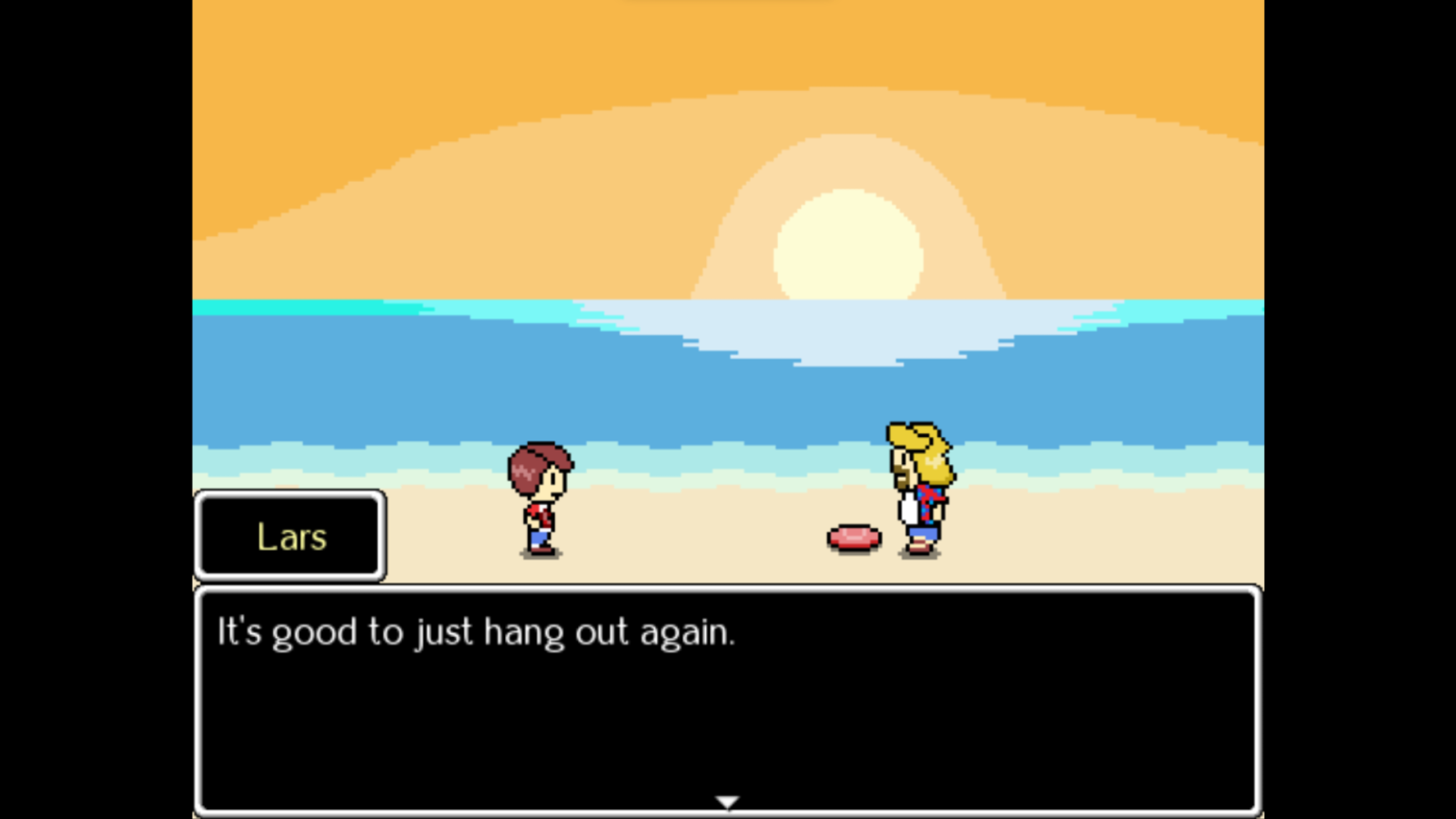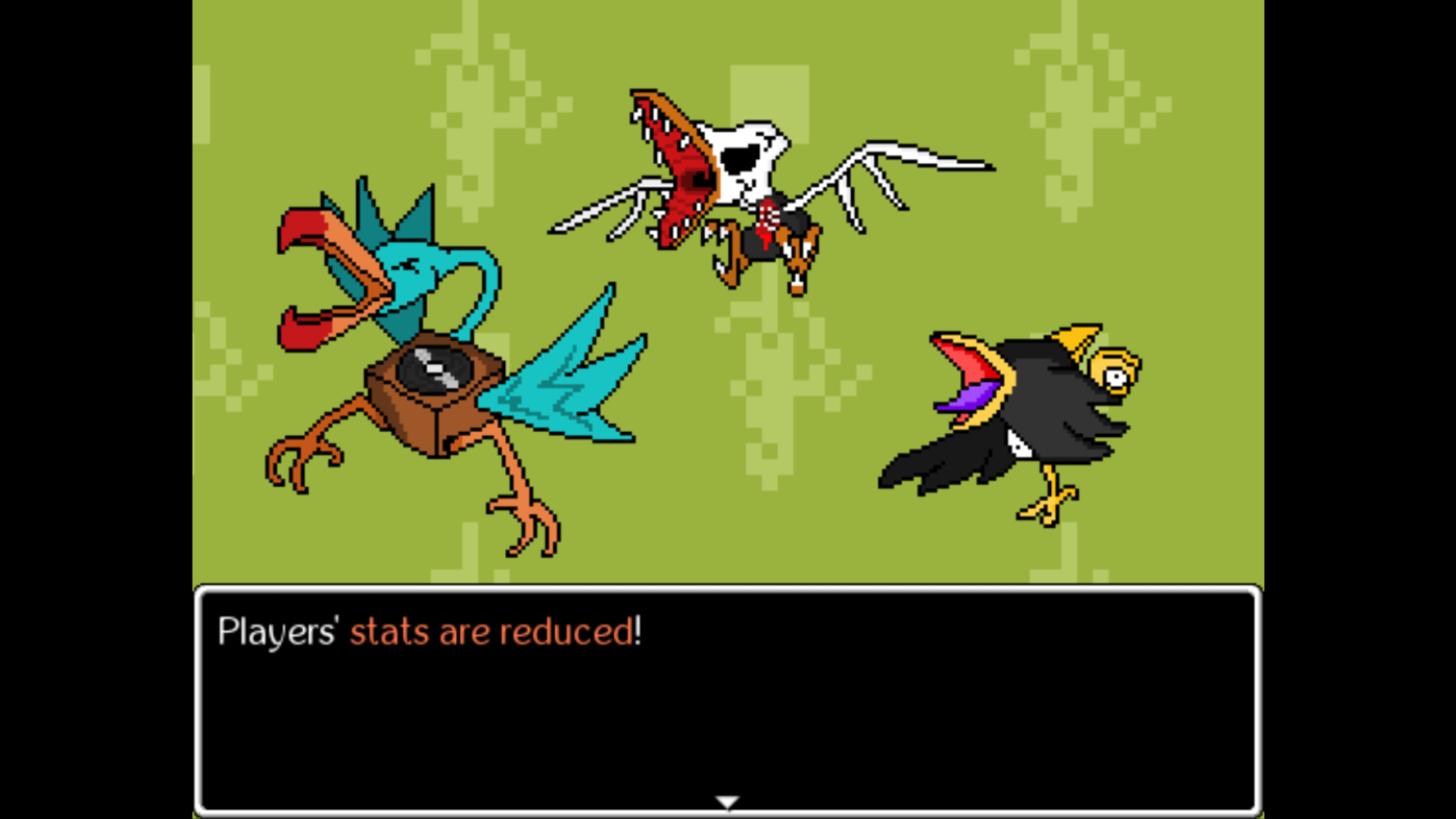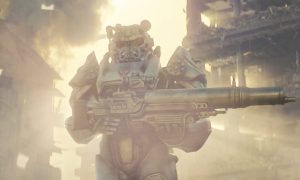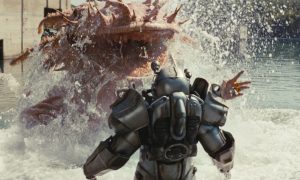Jimmy and the Pulsating Mass is among the greatest gifts that came out of RPGmaker’s toolsets, delivering an adventure with unmatched quality in its narrative design, pacing, combat, aesthetics, and music. While it takes clear inspiration from Earthbound, Jimmy (as I’ll refer to the game for brevity) forges its own identity, learning from its influences but creating something unmistakably unique. What starts as a dreamlike jaunt through fields of flowers develops into a deep, personal story that cements you in reality even as it spirals into absurdity. Too long has this game been overlooked by the gaming public, and I hope one day it receives the cult acclaim it so rightly deserves.
What follows is part review, part plea to give this game a shot, and part apology for not doing so earlier. I originally picked this game up essentially for free with Itch.io’s Bundle for Racial Justice; I found it quaint and a little odd, putting it down after an hour to search through the other thousand or so games I had just acquired. If I had just played for a few more minutes back then, I would have gotten to the turn, where suggestions of the game’s deeper narrative and mechanics start to show themselves. I won’t spoil the moment, but it happens when one of the zone’s playful, cartoonish inhabitants start to turn…wrong. The tone and music shifts, and the Sunshine ability which deals heavy damage to undead changes from curiosity to necessity. From there on I was hooked, ruining my social and professional life to find more time to complete this game. Since finishing it, everything I touch feels off, unable to match up to the complexity of Jimmy’s fights and story.

The game centers on protagonist Jimmy, a young boy, and his family, as they navigate this dreamscape to find what’s been afflicting its residents, and their ultimate fate. Most of your alternate party members are that family: Jimmy’s mother Helga tries to put a brave face on things, even as they devolve into hopelessness. His father Andrew, a scientist, searches for logical answers to any problem, whether or not those answers exist. His brother Buck relies on strength to protect his family, whether or not a problem can be solved by strength. Slacker uncle Lars doesn’t have the skills Andrew values, but is essential for morale when hopes are growing thin. Over the course of the game you learn their hopes and fears, their histories and drives, and how Jimmy has molded their lives in his short time on Earth.
Digging deeper into the game uncovers the “lore” of the family, via small moments that communicate so much about their outlooks. One of my favorites is a short optional dungeon based around Buck and his pathological need to work out, something that is both a sticking point and bonding experience for him and Jimmy. At the end you find the seed of this desire: a child Buck who only wants to hold his newborn brother. Insisting to his parents that he won’t drop Jimmy. That he’s strong enough to hold on. That nothing will happen to his brother while Buck is around. Most of the optional dungeons have these sorts of moments: small, mundane, but revelatory. Human.

The gameplay features turn-based combat, the main twist being Jimmy’s Empathy abilities, allowing him to transform into new creatures that he defeats throughout the game. Each creature grants overworld exploration abilities as well as active and passive combat abilities. As you level each class up, they boost your overall stats and unlock abilities that you can use in any class. Other party members cannot transform, but you can give them special techniques to use, and modify their equipment. Those items make a huge difference to their utility and playstyle, all of which gets more advanced with secret items. The combat and abilities are truly engaging, tasking you to chain together buffs, attacks, and equipment against enemies with unique abilities. You will be tested and you will be forced to make harsh choices to succeed. Too many to name are the optional abilities or equipment which offer power with a steep downside, like an accessory that boosts attack but drains health. Balancing your party and their equipment is just as crucial as making good in-the-moment combat decisions.
It bears mentioning that secrets and side content make up a huge portion of this game. Given the extra challenge, special items, and narrative insights of this side content, I consider it an absolute requirement. Only a few select end game sections fall short of this recommendation, and even then there are options to get around some of them while retaining their main benefits. If there is a downside to Jimmy’s optional content, it’s that some of it is slightly too obtuse to find or access. Use of the wiki will clue you in on some of the more easily missed areas, and you will thank yourself for seeking them out. There are a few particularly obtuse secrets relying on using the exploration abilities in ways that are far from clear.

All aspects of presentation are top notch. The pixel art seems simplistic and cheap at first, but that misconception dissolves as you get further into the game. Those designs set you up to think this is a simpler adventure than it is, and soon gets twisted by changes in the art design. Creatures, areas, and objects tell a subtle and consistent story about what is happening in Jimmy’s head and how he views the world. The title screen is a perfect crystallization: fun and whimsical, but haunted by something right at the center. What is the pulsating mass? How is it infecting this place? How can we stop it?
I don’t have sufficient history with music to tell you exactly why this soundtrack is so exceptional, except to tell you that it is. The game features tons of pieces full of variety and flare, suggesting all the tones and subtext of each area without ever growing old or overstaying their welcomes. The soundtrack is well worth putting on in the background of other work, even disconnected from the context of the game’s zones and subliminal meaning. Using all the techniques of typical chiptunes, it subtly transitions from quaint RPG adventure into its deeper themes.
It’s hard not to compare Jimmy to Omori, another Earthbound influenced game that starts with imaginative childlike adventure before getting darker. I have a lot of respect for that game, but Jimmy has a better focus on gameplay and its darkness is less overt. There’s a tenderness and love built into Jimmy which integrates directly into the exploration and combat abilities. Omori’s combat was easy and repetitive, ending up feeling like a chore while being too disconnected from the meat of what the game was trying to communicate. Looking back on it, you will be surprised how much each enemy, area, or musical sting suggests about what Jimmy is going through and where he’s headed next. The multiple routes in Omori also dragged over time, but Jimmy never lets up the intensity or urgency, whether you are pouring over all side content or rushing through the end of the main story.

Jimmy sets itself apart with the big design goals, but perhaps more importantly with small decisions that stack up over time. In a given area, random encounters will be skippable if you are a high enough level. If you enter somewhere with unskippable encounters, it’s an immediate signal that you may not be ready. If you’re higher level, you have the option of completing the fights or exploring at your leisure. Jimmy has a home base with furniture that you can find, buy, or steal from enemies, granting bonuses for completed sets (including secret sets with powerful abilities that you can find by matching the right types of items). You can only have ten of each type of healing item at a time, translating to challenges that are tightly tuned to the resources you have available.
The optional content extends from dungeons to an arena, arcade, and final boss-rush which resurrects former foes with enhanced stats. Included in those small things is optional dialogue for nearly every NPC in nearly every location of the game: one of the transformation creatures can move things, or people, around. While many of the puzzles or secrets rely on this ability, you can also move NPCs and hear their responses. Sometimes this clues you in to important secrets, and most of the time adds extra flavor. The fact that the game incentivizes you to try this out on every NPC – and believe me I did it for every single one – goes a long way to show the care put into its design.

What you find in this unassuming package is a game with its own vision and identity, relying on older gaming tropes to refine them to maximum effect or subvert them to serve its overall narrative. Almost never have I seen something with such focus, its combat, characters, music, aesthetics, and pacing all rounding out a game unlike anything I’ve come across. It isn’t an emotional gut punch; it’s more of an emotional McDonald’s breakfast sandwich: at first exciting and familiar, followed by a slow sense of sinking disgust. It turns within you over time, leaving an indelible impression of the horror of what you’ve just experienced. Jimmy goes farther and says more than any RPG I’ve played in years. It’s a thoughtful, artful game that doesn’t shy away from stellar combat to tell its story, rather building upon familiar mechanical tropes to bolster its narrative. Kasey Ozmey, I dug through the back of my closet to find my old tophat specifically so that I could remove it while writing this, as a signal to the power and intelligence of your project. At $14.99 you would be a fool to pass up this ~40-50 hour experience, and after this I know I will be on board for the next game, Hymn to the Earless God.
John Farrell is an attorney working to create affordable housing, living in West Chester Pennsylvania. You can listen to him travel the weird west as Carrie A. Nation in the Joker's Wild podcast at: https://jokerswildpodcast.weebly.com/

Jimmy and the Pulsating Mass is a gift. Its at first simplistic presentation belies a work of thought, care, and empathy. It satisfies those looking for quality in exploration, combat, and writing, while tying all elements together to focus the experience on communicating its message.
PROS
- Challenging, unique turn based combat and character building
- An emotional, powerful journey through dream and nightmare
- Enough side content to nearly double the game’s length
CONS
- Some of the best content is easy to miss without a guide

 Buy Now
Buy Now
 Buy Now
Buy Now
 Buy Now
Buy Now
 Buy Now
Buy Now
 Buy Now
Buy Now
 Buy Now
Buy Now















